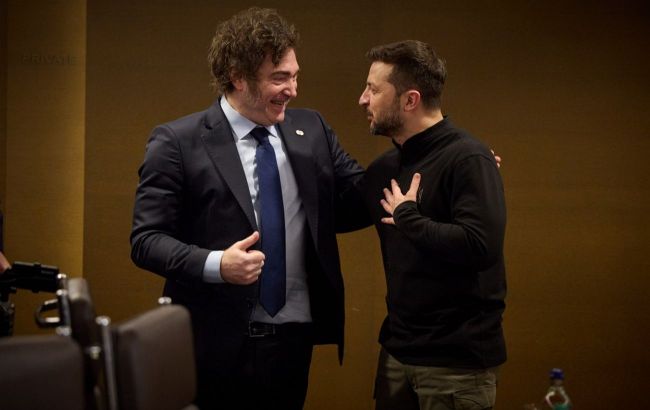Milei's tango: Why Argentina is increasing aid to Ukraine
 Photo: Javier Milei and Volodymyr Zelenskyy at the Peace Summit in Switzerland (president.gov.ua)
Photo: Javier Milei and Volodymyr Zelenskyy at the Peace Summit in Switzerland (president.gov.ua)
Geographically distant from Ukraine Argentina has made several important gestures toward Kyiv: from diplomatic statements and participation in international forums, supporting the country, to allocating specific assistance.
Read more about what is happening in Argentina, how it affects the attitude towards Ukraine, and what to expect in the future.
Contents
- Ambitions and problems Argentina had in the past
- Argentina's internal challenges and how it seeks support around the world
- Why Argentina is important for Ukraine
In recent months alone, Argentina has joined the Ramstein Group, handed over two Mi-17 multipurpose helicopters to Ukraine, and is offering to give Super Étendard attack aircraft. Besides, President Javier Milei joined the G7 summit in Italy and the peace summit in Switzerland.
All these steps, on the one hand, are related to the Argentine leader's dedication to Ukraine.
On the other hand, there is a more global logic to his actions. Milei is trying to dance the Argentine tango on several levels at once: solving both domestic problems and attracting resources from new partners abroad.
"This is part of the great changes we are making as a country after decades of turning away from the world," the Argentine president said at the peace summit.
After coming to power in December 2023, Javier Milei, a TikTok star, musician, economist, and TV host, turned the country upside down. He introduced shock therapy inside the country. Argentina's refusal to join the BRICS - an organization that includes Russia, China, India, Brazil, and several other countries - was meaningful in foreign policy.
In April, Milei officially asked NATO to grant his country a global partner status in the alliance. Countries with this status cooperate with NATO on security, defense, peacekeeping, and other areas.
"Argentina had a completely different foreign policy for a long time. For about 15 years, they were moving towards a deeper strategic partnership with China and Russia. But historically, Argentina has always followed the so-called third way. Still, democratic values, deeper relations with the European Union, with the United States, have always prevailed in the mentality of the population," Kateryna Vakarchuk, Associate Professor of International Relations at Odesa Mechnykov National University, explains to RBC-Ukraine.
The new president of Argentina openly declares plans to return the country's influence and leadership in Latin America that it had before.
Ambitions and problems Argentina had in the past
Argentina's power peaked in the early 20th century. In 1870-1930, the country was the main rival of the United States in the struggle for economic leadership in both Americas. Argentina was one of the ten richest countries in the world in average wages and gold reserves. In GDP per capita, it was ahead of France, Germany, and Spain - its former metropole. President Milei is now appealing to that era.
Economic power was followed by political influence. Argentina had long competed with Brazil to dominate in South America. But starting in the 1930s, a series of mistakes led to a slowdown in the economy. But social spending remained high. As a result, an increasing external debt.
In politics, the country was constantly waving between liberals who promised to restore economic freedoms and the left with their populist approaches. The most famous representative of the latter was longtime Argentine President Juan Domingo Perón.
To a large extent, this division still exists in Argentina. Most of Argentina's presidents have been Peronists: Néstor Kirchner in 2003-2007, his wife Cristina Fernández de Kirchner, who was a president in 2007-2015, and Alberto Fernández in 2015-2019.
Only in 2019 did the political pendulum swing in the other direction. The liberal Mauricio Macri became president, and eventually in 2023, the anarcho-capitalist (as he calls himself) Javier Milei. The latter's coming to power is natural, as the previous presidents failed to deal with many long-standing systemic problems.
Argentina's internal challenges and how it seeks support around the world
At the time Milei came to power, about 40% of the population lived below the poverty line, and the country had inflated public spending and a budget deficit of 4.4%.
"The presidents - the Kirchner couple and then Mauricio Macri - did not meet economic expectations. The country slipped into the abyss - popular social reforms with large subsidies without economic growth led to rising inflation. That's why Milei became president, promising to improve the domestic situation," says Kateryna Vakarchuk.
Argentina is gradually getting out of the economic crisis. Several reforms have already been launched. The presidential team has turned off the printing money press and drastically reduced subsidies for energy and transportation. They have also reduced contributions to local budgets and capital expenditures. As a result, Argentina has a primary budget surplus of $2.57 billion for the fifth month in a row, meaning that revenues exceed expenditures. Monthly inflation decreased from 25% in December 2023 to 4.2% in May 2024.
The lack of support in the parliament also remains a problem for Milei. His coalition, La Libertad Avanza (Liberty Advances), does not have a majority, so he has to either compromise or use presidential decrees.
For example, the Argentine president insists that the parliament allow him to privatize more than two dozen state-owned companies: the state airline, railroad, postal service, and national water service. But all these steps will have an effect only with time. So far, according to the IMF, Argentina's economy is expected to shrink by 3.5% this year.
President Milei has many ambitions but he does not always have enough resources to realize them. Therefore, he is looking for additional resources abroad. This goal is now the main one.
The first direction: Argentina (like Ukraine) is trying to attract funds from the International Monetary Fund. The current credit line provides USD 44 billion in exchange for reforms, but these are rather resources to patch holes in the budget.
Argentina is counting on foreign investment to move towards economic growth. Above all, from the United States and the European Union, so the relations are being restored. Not only the economy but also politics matter here.
"So far, the United States does not see Brazil as an alternative leader in Latin America, because it cooperates with China and Russia. And Argentina is a country that can be brought to a leadership position in the region. Moreover, we know that in Mexico (another important partner of the United States), a left-wing president came to power again, demonstrating not entirely friendly stance towards the United States. That is why Argentina is now in favor," emphasizes Kateryna Vakarchuk.
During most of Milei's foreign visits, attracting investments is a red thread. So far, there have not been many investments. However, Milei talks not only with politicians but also with the heads of the world's largest companies, such as Elon Musk and Mark Zuckerberg.
Why Argentina is important for Ukraine
The president of Argentina has long and openly expressed his commitment to Ukraine, since the beginning of the full-scale Russian invasion. In March 2022 he even wore a pin with the Ukrainian flag in parliament. "Those of us who defend the idea of freedom cannot tolerate or accept an invasion like Russia has done in Ukraine," Milei said at that time.
Besides, many objective reasons stimulate the rapprochement between Kyiv and Buenos Aires. First and foremost, common allies - the US and the EU.
The initiative for cooperation comes not only from Argentina. Last December, President of Ukraine Volodymyr Zelenskyy went on an overseas trip, which included a meeting with the newly elected Milei.
This was a breakthrough, as the last contact at the level of heads of state between the two countries was in 2012. There is also an understanding of what Ukraine wants from Argentina, as Ukrainian diplomats plan to establish contacts with other Latin American states through Argentina.
"Everyone already knows that Argentina will advocate for Ukraine. Through Argentina, we just want to enter the region, improve our relations, improve the image of Ukraine in Latin America, tell the truth about Ukraine, especially since there is a huge Ukrainian diaspora there - about 300,000 people with Ukrainian roots," says Kateryna Vakarchuk.
Next, practical steps are necessary. In March of this year, Javier Milei announced a visit to Ukraine in June. So far, this trip has not taken place, but it remains in the plans. He also stated that he planned to hold a Latin American support summit for Ukraine at the end of this year. According to RBC-Ukraine data, Argentina expressed a desire to become, in fact, the organizer of the summit, but there was no particular activity from the Argentine president afterward. However, recent Milei's actions and statements prove that Argentina will continue to be among Ukraine's friends in any case.
Sources: public statements by Javier Milei, statistics from open sources, and comments by Associate Professor of the Department of International Relations at the Odesa National University Kateryna Vakarchuk.

